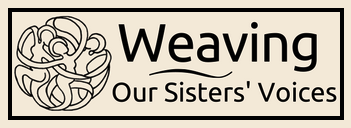Religious Studies Voices
For the 2015 production, I was able to add Linda Schearing’s religious studies colleague, Rabbi Elizabeth Goldstein. We had the great pleasure of sharing the script with her and then inviting her to visit a rehearsal. She shared her perspectives on Linda’s script, our production, and her knowledge of the Jewish tradition of Midrash. She also happened to have a Yad with her as she had just come from class. She showed the cast how it was a delicate and ornate tool that was used as a ‘Torah pointer’ for following along in reading the scripture of the Torah. No one in this cast had seen this item before and the pointer emphasized the history and respect of these great stories from both the Jewish and Christian religions. Her visit was a rich exchange of ideas and customs, where we had questions for her and she was happy to share. She was, however, most interested in watching some of the rehearsal. We began by showing her the prologue and conflict which sets the stage of the production. When we asked which of the healing stories she wanted to see, she requested the story of Tamar. She shared that she was curious about how we performed this challenging concept of leveret marriage and Tamar’s choices to ensure her future as a widow. After we performed it she was clearly moved and very excited to do anything she could do to support the production.
Dr. Schearing included the stories in many of her classes, and one of our 2015 cast members was in her Hebrew Bible course the Fall we were rehearsing and performing. The student talked about how being in the class enriched her understanding of the stories, but also how Dr. Schearing would call on her and they would share how the performance brought the stories to life.
One of our audience members was Karin Heller, PhD., D.Div., Dr. theol. habil., Professor of Theology from Whitworth University across town. Dr. Heller had seen the production in 2010 and was excited to see it again. Her enthusiasm was apparent directly after the performance ended, as she wanted to talk with me about bringing the production to Whitworth for the Spring of 2016. She had not been aware that we performed at Whitworth in 2006 during our tour. Dr. Heller had found Weaving Our Sisters’ Voices not only moving, but a direct connection to the work she did in her classes.
She shared a number of reactions from her students after they saw the Spring 2016 tour. Here are some of the comments the theology students made.
- Our Sisters’ Voices taught me how to weave their stories with my own, and I’m grateful.
- These women became human, and in their humanity, I think that I was able to see God’s voice through their stories, shaping their lives and mine.
- The Levite’s woman is unnamed, unloved and forgotten. Her horrific story finally knocked me off my pedestal of blindness. Prior to this play it has been very hard for me to personally identify with female characters in the Bible. Weaving Our Sisters’ Voices allowed me to connect to Tamar. She was a woman who stood up for herself. This is something I struggle with. Tamar doesn’t allow the patriarchy to deny her the quality of life she deserves. Her story is inspiring to me to not allow others to walk over me. . Tamar will help me to pursue my goals in life. Alongside standing up for myself, Tamar’s story has helped me understand how I may have oppressive attitudes towards women. I believe the major benefit I received from this play was realizing the one-sidedness of the Bible. My perspective of Scripture has morphed into a more inclusive understanding of what is in the Bible and what has been left out. This realization will allow me to justify and comprehend why some parts don’t make complete sense to me. Rather than skipping over confusing texts, I can use what I’ve learned and tactfully interpret difficult sections of the Bible.
- I absolutely loved the show Weaving Our Sisters’ Voices. I have been thinking about the Church lately – about why we were the church, how I can serve it better, and I can learn from both the past and the present church. This show helped me to cherish the church, and specifically the women of the church, in new ways. .. The final thing that truly struck me about this performance is the celebration of the women in the church. I had not heard many of these stories before, but as I watched, I became aware that these women are my sisters. The last line of the play struck me: “Women’s voices. Sisters’ voices. Our voices.” I love this play so much because it reminds me that the stories of these women are my story. They are fellow sisters in Christ – we are connected, and there is much that I have to learn from them.
One male student of Islamic background had this to say:
"One thing that caught me off guard when I was watching the show was how relatable all the stories were to women off all backgrounds and all different religions, especially in Islam and how woman are treated (and are still treated to this day.) I remember a lot of these woman's stories echoing in the back of my mind and how most of those stories were very similar to the issues a lot of woman face today."
– Saeed Al-Thumali, Gonzaga student, audience member 2015
